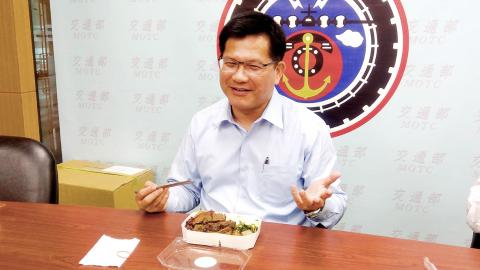The government aims to have 20 million international visitors per year by 2030, Minister of Transportation and Communications Lin Chia-lung (林佳龍) said yesterday, adding that the goal would be achieved by upgrading the Tourism Bureau to become the tourism administration.
The ministry has identified three main factors that are to affect the tourism industry this year, including strikes organized by unions representing China Airlines and EVA Airways employees, China’s suspension of independent travel to Taiwan this month and curtailing of travelers to Taiwan on tour groups next month, and pro-democracy protests in Hong Kong, Lin told reporters at a luncheon in Taipei.
The ministry would implement a program next month to subsidize domestic travelers for fall and winter tours, part of its strategy to boost domestic tourism, Lin said.

Photo: Cheng Wei-chi, Taipei Times
With the decline in cross-strait visitors, the ministry also plans to draw more international visitors by waiving visa requirements under certain conditions for visitors from Southeast Asian nations and other measures, he said.
The ministry would find ways to help tour operators facing financial difficulties due to the decrease in Chinese travelers, he said.
The winter and spring travel subsidies that were implemented in the first half of this year helped raise occupancy rates at international hotels and resorts, regular hotels, and bed and breakfasts, the ministry said.
They rose 7.1 percent, 11.9 percent and 31.3 percent respectively compared with the same period last year, it said.
The Tourism Bureau should quickly be upgraded to an administration, Lin said.
“We are striving to become one of the world’s top tourist destinations, but the agency that we have is not up to the task. Once it has been upgraded, the budget and personnel that it can appropriate would increase, which will help advertise the nation in the international community,” he said.
The bureau’s personnel structure has not changed for 30 years, he said.
With its budget, it cannot afford to hire additional staff or send more people to its overseas branches, he said.
Almost half of the bureau’s annual budget goes to maintaining tourism facilities in national scenic areas, which leaves it with hardly any money to fund tourism campaigns, Lin said.
“We have suggested that the government have a separate fund to maintain tourism facilities, with funding for the bureau to be used to promote Taiwan as a tourist destination,” he said.
“We hope that the Legislative Yuan would pass an organizational act for a tourism administration in the next legislative session,” he said, adding that lawmakers across party lines have shown support for the change.
The ministry this year is to present a white paper titled Taiwan Tourism 2030, which would outline its tourism plans, Lin said.
It would also outline plans for a national tourism conference to hear thoughts from tourism service providers, he said.

Alain Robert, known as the "French Spider-Man," praised Alex Honnold as exceptionally well-prepared after the US climber completed a free solo ascent of Taipei 101 yesterday. Robert said Honnold's ascent of the 508m-tall skyscraper in just more than one-and-a-half hours without using safety ropes or equipment was a remarkable achievement. "This is my life," he said in an interview conducted in French, adding that he liked the feeling of being "on the edge of danger." The 63-year-old Frenchman climbed Taipei 101 using ropes in December 2004, taking about four hours to reach the top. On a one-to-10 scale of difficulty, Robert said Taipei 101

Nipah virus infection is to be officially listed as a category 5 notifiable infectious disease in Taiwan in March, while clinical treatment guidelines are being formulated, the Centers for Disease Control (CDC) said yesterday. With Nipah infections being reported in other countries and considering its relatively high fatality rate, the centers on Jan. 16 announced that it would be listed as a notifiable infectious disease to bolster the nation’s systematic early warning system and increase public awareness, the CDC said. Bangladesh reported four fatal cases last year in separate districts, with three linked to raw date palm sap consumption, CDC Epidemic Intelligence

US climber Alex Honnold left Taiwan this morning a day after completing a free-solo ascent of Taipei 101, a feat that drew cheers from onlookers and gained widespread international attention. Honnold yesterday scaled the 101-story skyscraper without a rope or safety harness. The climb — the highest urban free-solo ascent ever attempted — took just more than 90 minutes and was streamed live on Netflix. It was covered by major international news outlets including CNN, the New York Times, the Guardian and the Wall Street Journal. As Honnold prepared to leave Taiwan today, he attracted a crowd when he and his wife, Sanni,

Taiwanese and US defense groups are collaborating to introduce deployable, semi-autonomous manufacturing systems for drones and components in a boost to the nation’s supply chain resilience. Taiwan’s G-Tech Optroelectronics Corp subsidiary GTOC and the US’ Aerkomm Inc on Friday announced an agreement with fellow US-based Firestorm Lab to adopt the latter’s xCell, a technology featuring 3D printers fitted in 6.1m container units. The systems enable aerial platforms and parts to be produced in high volumes from dispersed nodes capable of rapid redeployment, to minimize the risk of enemy strikes and to meet field requirements, they said. Firestorm chief technology officer Ian Muceus said